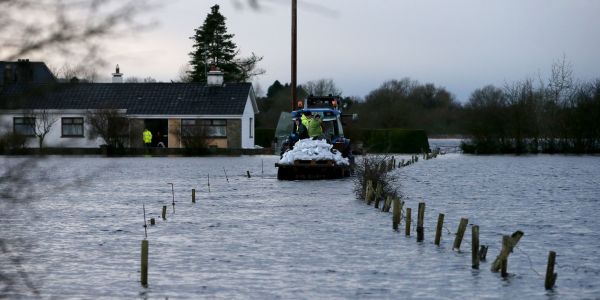Top government officials charged with tackling the flooding crisis did not meet for up to six years, a watchdog has revealed.
During the period from 2009 until the middle of last year there were five major incidents, two people died in floods and thousands of homes, farms and businesses were destroyed.
Inspectors in the Comptroller and Auditor General’s (C&AG) office found senior officials in control of “flood risk and response” did not sit down together from 2009 until July 2015.
They were part of the high-level oversight body called the Interdepartmental Co-Ordination Group which met from 2006 to 2009 but did not sit down together again until last summer.
A second group of government experts were charged with assessing and managing flood risk based on the study of river catchments but they did not meet for four years up to November 2014.
The C&AG said: “While (Office of Public Works) OPW established structures to monitor project implementation, it was found that, in the case of the pilot projects, there was a lack of clarity over the precise roles of those oversight bodies.”
From 2005 to 2014 329 million euro was spent on flood defences and research and another 430 million euro is being spent over the next six years on similar prevention projects.
But the C&AG warned money was still being spent without using all the available comprehensive analysis of flood risks.
“In order to derive maximum value from the limited funds available, it is essential that funding allocation decisions are evidence-based,” it said.
“However, 12 years on from the report of the Flood Policy Review Group and eight years after the EU Floods Directive, substantial capital expenditure continues to be incurred on an annual basis, without the full benefit of the comprehensive analysis and strategic plans.”
The C&AG also found there were no detailed project budgets in the Office of Public Works for four pilot flood relief projects.
Estimates ran to 3.5 million euro and they ultimately cost 8.9 million euro.
The C&AG’s office said smaller scale pilot projects are potentially useful if novel or innovative technology is being used and cost estimates are uncertain.
But it warned: “Nevertheless, it is difficult to exercise cost control over individual project elements and the project as a whole, without a detailed project budget.”
The high level government body charged with overseeing flood risk and response is headed by Simon Harris, junior minister in charge of the OPW.
He was in the job for a year before it met.
It also has members from his department and nine other government departments and some councils.
The inter-departmental body met once in 2006, twice in 2008, once in 2009 and then twice in 2015.
The second group charged with overseeing the work of research on catchments met six times in 2009 and 2010 before taking a four year break.
Elsewhere the report revealed that the OPW’s work on flooding will produce 40,000 maps, about 13,000 of which will be sent to the European Commission.
It said 300 flood risk areas have been identified and 6,700km of water courses examined.
Tom Turley, flood project chairman with the Irish Farmers’ Association, said: “We have these high level interdepartmental groupings that have met six times and it shows the complete and utter lack of interest of successive ministers.”
Mr Turley, who farms in east Galway in the Shannon catchment, said water is still being pumped from flooded homes in the Curraghboy area of Roscommon months after the record rains from Storm Desmond.
“This report brings it all home. The fact that they have not met shows a complete lack of interest or urgency or a sense of will to stop this problem,” he said.
“History has shown us now quite clearly the lack of urgency, particularly among the ministers in the Office of Public Works.”
The OPW claimed the high-level group did not meet for six years as the study of flood-prone areas was mainly technical “and did not necessitate the meeting”.
“The group is now meeting on a regular basis and is considering a whole-of-government approach to flood risk management,” a spokeswoman said.
One report on the flooding crisis was sent to government in January and a second will be submitted in the summer.
